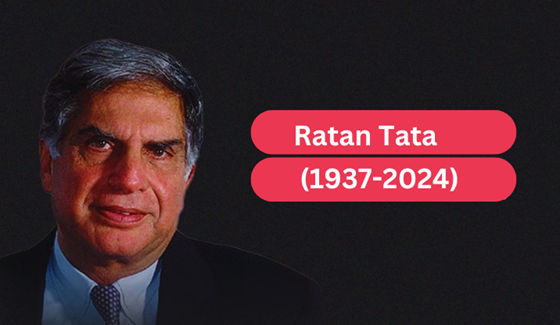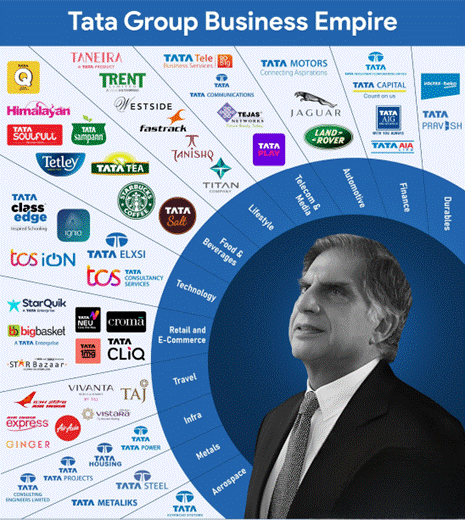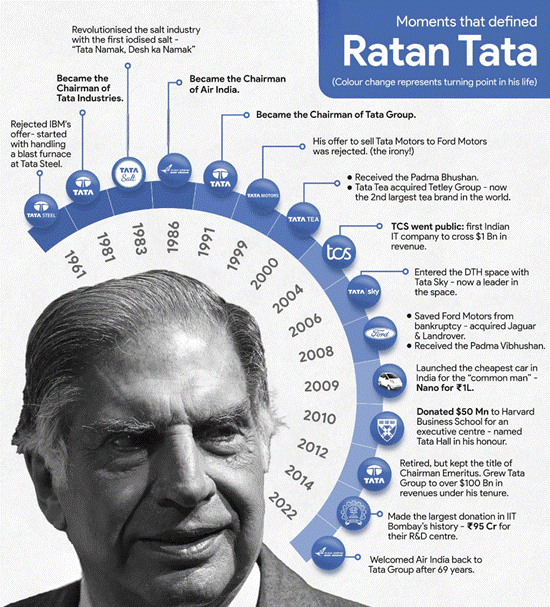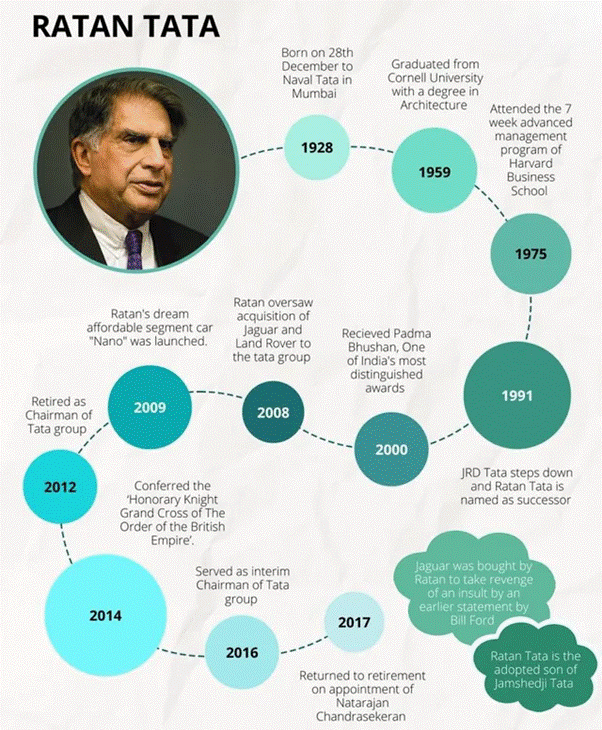PREVIOUS
Ratan Tata (28 Dec 1937 - 09 Oct 2024)
October 12 , 2024
190 days
1121
0
Ratan Tata (28 Dec 1937 - 09 Oct 2024)
(இதன் தமிழ் வடிவத்திற்கு இங்கே சொடுக்கவும்)
Introduction
- Ratan Tata, the former Emeritus Chairman of Tata Group, was a transformative figure in both industry and philanthropy, leaving an indelible mark on the global landscape.
- His visionary leadership has not only propelled Tata Group into a formidable global entity but also emphasized the importance of social responsibility and community welfare.
- The passing of Ratan Naval Tata, the esteemed former chairman of Tata Group, marks the end of an era for one of India’s most revered business figures.
- At 86, Tata was not just a businessman; he was a symbol of India’s economic resurgence in the 21st century.

Ratan Tata
- Ratan Tata was a distinguished Indian industrialist and the driving force behind the Tata Group, a conglomerate founded by his great-grandfather, Jamsetji Tata.
- After graduating in architecture from Cornell University, he returned to India in 1962 and began his career within the Tata Group.
- His tenure saw the transformation of the company into a global powerhouse, with a diverse portfolio ranging from steel and automobiles to software and telecommunications.
Early Journey and Leadership
- Ratan Tata began his career in 1961 at Tata Steel in Jamshedpur, working on the shop floor.
- This grassroots experience grounded his understanding of the business and shaped his future leadership style.
- Under his guidance, Tata Group has expanded across diverse sectors including steel, automobiles, IT, and hospitality.

Achievements
- Ratan Tata’s leadership marked a transformative phase for the Tata Group.
- He took over as chairman in 1991, succeeding J.R.D.
- Tata implemented critical organizational reforms that included enforcing retirement ages and promoting young talent to leadership positions.
- Under his guidance, the group expanded its footprint globally, embarking on significant international acquisitions, including:
- Tetley Tea (2000): This acquisition marked Tata's entry into the global beverage market.
- VSNL (2002): The acquisition of Videsh Sanchar Nigam Limited positioned Tata as a key player in telecommunications.
- Corus Steel (2007): One of the largest takeovers by an Indian company, this acquisition bolstered Tata’s presence in the global steel industry.
- Partnership with Starbucks in 2012.
- Jaguar and Land Rover (2008): This strategic move enhanced Tata’s reputation in the luxury automobile sector.
- Air India (2022): Tata's role in acquiring the national carrier underscored his commitment to reviving iconic Indian brands.

Notable Milestones
- Tata's tenure was marked by several groundbreaking initiatives and strategic acquisitions that redefined the company:
- Tata Indica (1998): The launch of India’s first indigenously designed passenger car revolutionized the Indian automotive industry.
- Tata Nano (2008): Priced at Rs 1 lakh, the Nano was conceived to make car ownership accessible to the Indian middle class, reflecting Tata's commitment to affordability and innovation.
Philanthropic Endeavors
- Ratan Tata's impact extended far beyond business, with a deep commitment to philanthropy and social welfare:
Tata Trusts
- He directed a substantial portion of Tata Group's profits to charitable causes, with Tata Trusts one of India’s largest charitable organizations channelling 65% of profits into initiatives focused on education, healthcare, and rural development.
Covid-19 Relief
- In response to the pandemic, Tata donated Rs 500 crore in 2021 to support India’s fight against Covid-19, demonstrating his commitment to national welfare during crises.
Global Philanthropy
- His generosity included a USD 50 million donation to Harvard Business School to establish an executive center, reflecting his belief in the power of education to shape future leaders.
Healthcare Initiatives
- Tata played a crucial role in establishing the Tata Medical Center in Kolkata, providing affordable cancer care to underprivileged communities.
- Following the 2008 Mumbai terrorist attacks, he established the Taj Public Service Welfare Trust to assist victims and their families.
Animal Welfare
- A lifelong advocate for animal welfare, Tata ensured that stray animals had access to care at Tata Group's headquarters.
- His last major initiative was inaugurating a state-of-the-art animal hospital in Mumbai in mid-2024, offering 24/7 emergency care.
Commitment to Nation Building
The Navi Mumbai International Airport
- Ratan Tata's vision was not limited to corporate success; it extended to nation-building.
- One notable example is his encouragement during the development of the Navi Mumbai International Airport, a project that faced numerous challenges.
- His faith in the potential of this endeavour helped galvanize support and resources, making the airport a reality that will benefit countless citizens.
Purpose Over Profit
- For Tata, success was never just about the bottom line.
- His commitment to serving the greater good inspired initiatives like the modernization of Dharavi, aiming to uplift lives and create sustainable environments.
Contributions Beyond Business
- After stepping down from active leadership, Ratan Tata continued to shape India's economic landscape as a prominent investor in startups.
- He backed several innovative companies, including Paytm, Ola Electric, and Urban Company, fostering entrepreneurship and technological advancement in India.
- His accolades extended beyond the business realm.
- He was awarded Assam Baibhav by the Government of Assam in 2021 and recognized as an Honorary Officer of the Order of Australia in 2023.
- Other honors included an Honorary Doctor of Science from IIT Bombay in 2008 and an Honorary Knight Grand Cross of the Order of the British Empire (GBE) by Queen Elizabeth II in 2014.
- He also received the Honorary Citizen Award from the Government of Singapore in 2008.
- Honored with the Padma Bhushan in 2000 and the Padma Vibhushan in 2008.
- A licensed pilot, he led a relatively modest lifestyle, earning admiration not just in business circles but also among the general populace.

Legacy
- Ratan Tata's contributions to industry and society are profound.
- He leaves behind a legacy of innovation, compassion, and commitment to social responsibility.
- His vision helped transform the Tata Group into a symbol of excellence and resilience, and his philanthropic efforts have inspired countless individuals to pursue not just profit but purpose.
- As India navigates its future, Ratan Tata's influence will undoubtedly continue to resonate, reminding us of the power of visionary leadership and the importance of giving back to society.
-------------------------------------
Leave a Reply
Your Comment is awaiting moderation.


